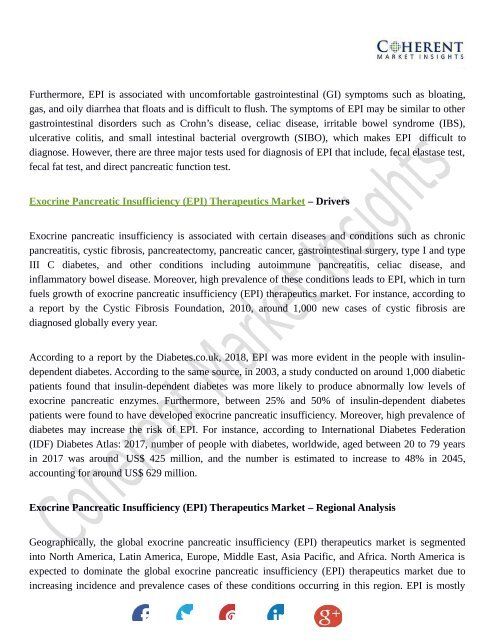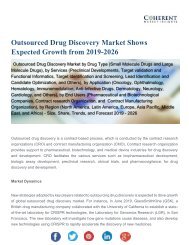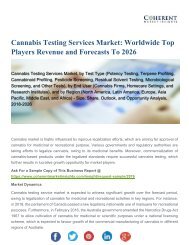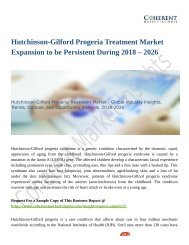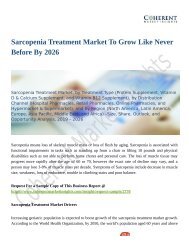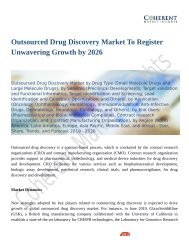Exocrine-Pancreatic-Insufficiency-(EPI)-Therapeutics-Market-
Exocrine pancreatic insufficiency (EPI) is a condition associated with deficiency of exocrine pancreatic enzymes that results in the inability to digest food or maldigestion. EPI may be associated with certain diseases and conditions that affect the pancreas such as cystic fibrosis, chronic pancreatitis, Shwachman–Diamond syndrome, and others. Chronic pancreatitis (CP) is the most common cause of EPI in adults that is followed by cystic fibrosis (CF). CF is an inherited genetic condition that leads to chronic disease, which affects lungs, digestive, and reproductive system. Patients suffering from exocrine pancreatic insufficiency cannot properly digest proteins, fats, and carbohydrates in the food that results in poor absorption of nutrients in the body.
Exocrine pancreatic insufficiency (EPI) is a condition associated with deficiency of exocrine pancreatic enzymes that results in the inability to digest food or maldigestion. EPI may be associated with certain diseases and conditions that affect the pancreas such as cystic fibrosis, chronic pancreatitis, Shwachman–Diamond syndrome, and others. Chronic pancreatitis (CP) is the most common cause of EPI in adults that is followed by cystic fibrosis (CF). CF is an inherited genetic condition that leads to chronic disease, which affects lungs, digestive, and reproductive system. Patients suffering from exocrine pancreatic insufficiency cannot properly digest proteins, fats, and carbohydrates in the food that results in poor absorption of nutrients in the body.
Create successful ePaper yourself
Turn your PDF publications into a flip-book with our unique Google optimized e-Paper software.
Furthermore, <strong>EPI</strong> is associated with uncomfortable gastrointestinal (GI) symptoms such as bloating,<br />
gas, and oily diarrhea that floats and is difficult to flush. The symptoms of <strong>EPI</strong> may be similar to other<br />
gastrointestinal disorders such as Crohn’s disease, celiac disease, irritable bowel syndrome (IBS),<br />
ulcerative colitis, and small intestinal bacterial overgrowth (SIBO), which makes <strong>EPI</strong> difficult to<br />
diagnose. However, there are three major tests used for diagnosis of <strong>EPI</strong> that include, fecal elastase test,<br />
fecal fat test, and direct pancreatic function test.<br />
<strong>Exocrine</strong> <strong>Pancreatic</strong> <strong>Insufficiency</strong> (<strong>EPI</strong>) <strong>Therapeutics</strong> <strong>Market</strong> – Drivers<br />
<strong>Exocrine</strong> pancreatic insufficiency is associated with certain diseases and conditions such as chronic<br />
pancreatitis, cystic fibrosis, pancreatectomy, pancreatic cancer, gastrointestinal surgery, type I and type<br />
III C diabetes, and other conditions including autoimmune pancreatitis, celiac disease, and<br />
inflammatory bowel disease. Moreover, high prevalence of these conditions leads to <strong>EPI</strong>, which in turn<br />
fuels growth of exocrine pancreatic insufficiency (<strong>EPI</strong>) therapeutics market. For instance, according to<br />
a report by the Cystic Fibrosis Foundation, 2010, around 1,000 new cases of cystic fibrosis are<br />
diagnosed globally every year.<br />
According to a report by the Diabetes.co.uk, 2018, <strong>EPI</strong> was more evident in the people with insulindependent<br />
diabetes. According to the same source, in 2003, a study conducted on around 1,000 diabetic<br />
patients found that insulin-dependent diabetes was more likely to produce abnormally low levels of<br />
exocrine pancreatic enzymes. Furthermore, between 25% and 50% of insulin-dependent diabetes<br />
patients were found to have developed exocrine pancreatic insufficiency. Moreover, high prevalence of<br />
diabetes may increase the risk of <strong>EPI</strong>. For instance, according to International Diabetes Federation<br />
(IDF) Diabetes Atlas: 2017, number of people with diabetes, worldwide, aged between 20 to 79 years<br />
in 2017 was around US$ 425 million, and the number is estimated to increase to 48% in 2045,<br />
accounting for around US$ 629 million.<br />
<strong>Exocrine</strong> <strong>Pancreatic</strong> <strong>Insufficiency</strong> (<strong>EPI</strong>) <strong>Therapeutics</strong> <strong>Market</strong> – Regional Analysis<br />
Geographically, the global exocrine pancreatic insufficiency (<strong>EPI</strong>) therapeutics market is segmented<br />
into North America, Latin America, Europe, Middle East, Asia Pacific, and Africa. North America is<br />
expected to dominate the global exocrine pancreatic insufficiency (<strong>EPI</strong>) therapeutics market due to<br />
increasing incidence and prevalence cases of these conditions occurring in this region. <strong>EPI</strong> is mostly


